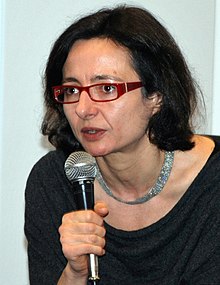Agnieszka Graff
Agnieszka Graff | |
|---|---|
 | |
| Born | 1970 (age 50–51) Warsaw |
| Occupation | writer, commentator, translator, lecturer |
| Language | Polish |
| Alma mater | Amherst College |
| Years active | 1999-present |
Agnieszka Graff (born 1970 in Warsaw[1]), is a Polish writer, translator, commentator, feminist and women's and human rights activist. She studied in Oxford University, Amherst College (Massachusetts, U.S.), and graduated from School of Social Sciences at Polish Academy of Sciences. She completed her PhD in English literature in 1999.[2] In 2001 she published World without women, which was nominated to Nike Award in 2002. She works at the Warsaw University's Institute of the Americas and Europe, and gives lectures on gender studies.[3]
Her essays and features were published in "Gazeta Wyborcza" (mass circulation liberal newspaper), "Literatura na Świecie" ("World Literature") and "" ("The Thorn", feminist magazine).
She is a co-founder of women's organisation (8 March Women's Coalition), with which she organises the annual Manifa Warsaw women's march.[4] In 2007-2010 Graff was a member of the Precedent Cases Programme's Programme Board at the International Helsinki Federation For Human Rights.[5]
Agnieszka Graff herself is Jewish.[6] She was a wife of a photographer and french press correspondent Bernard Osser, with whom she has a son born in 2008.[7] In February 2021, she came out, by writing on her social media that she is in a commmited relationship with a woman.[8] In March-April issue of the only Polish LGBTIA magazine Replika Graff and her partner, culture anthropologist Magdalena Staroszczyk, talked more about their relationship and queer identities.[9]
Selected works[]
- Świat bez kobiet. Płeć w polskim życiu publicznym. (World without women: gender in Polish public life). Warsaw 2001.
- Rykoszetem. Rzecz o płci, seksualności i narodzie. (Ricochet : on gender, sexuality, and nation). Warsaw 2008.
- Magma i inne próby zrozumienia, o co tu chodzi. (Magma: and Other Attempts to Understand, What's Up with It). Warsaw 2010.
- Matka Feministka. (Mother Feminist), Warsaw 2014.
- Jestem stąd. (I am from here, an interview with Michał Sutowski), Warsaw 2014.
- Memy i graffy. Dżender, kasa i seks. (Memes and graffs. Gender, cash and sex, together with ), Warsaw 2015.
References[]
- ^ Graff, Agnieszka. "Dziewczyna opozycjonisty". In Walczewska, Stanisława (ed.). Feministki. Własnym głosem o sobie. pp. 89–108. ISBN 83-915460-5-5.
- ^ Pracownicy, archived from the original on 2016-05-22, retrieved 2021-03-29
- ^ "Agnieszka Graff-Osser - Studenci, pracownicy - Uniwersytet Warszawski - USOSweb". usosweb.uw.edu.pl (in Polish). Retrieved 2017-07-24.
- ^ "Kongres Kobiet" (in Polish). Archived from the original on 2016-06-10. Retrieved 2021-03-29.
- ^ "Rada Programowa" (in Polish). Archived from the original on 2019-01-20. Retrieved 2021-03-29.
- ^ "Szatani, bądźcie czynni!" (in Polish). Tygodnik Przegląd. 26 July 2007. Retrieved 25 July 2015.
- ^ "Wyprawa, nie wyprawka | Tygodnik Powszechny".
- ^ "Słynna polska pisarka zrobiła coming out" (in Polish).}
- ^ Dunin, Kinga (2021-03-29), "Coming out: znana feministka Agnieszka Graff i jej partnerka Magda Staroszczyk – pierwszy wspólny wywiad | Replika Online", Replika (in Polish) (90), retrieved 2021-03-30
External links[]
- 1970 births
- Living people
- Polish feminists
- 20th-century Polish Jews
- Polish women writers
- 21st-century Polish women writers
- University of Warsaw faculty
- LGBT writers from Poland